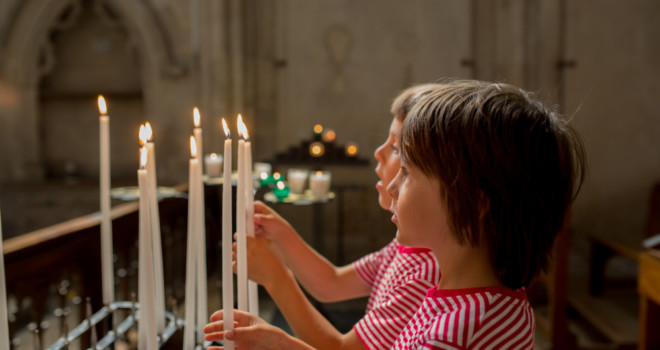At Mass this morning, many beautiful families filled the pews. A father in front of us put his arm around his son. Another child hugged his grandmother. A mother held her toddler in her lap and lovingly kissed his head.
Meanwhile, behind us, a child screamed. Next to us, an exasperated father carried his squirming son down the aisle toward the back of the church. And I was reminded once again that although we join the heavenly choirs at Mass, we are still living on earth, where family life is not perfect.
Even those families that appear immaculate have struggles that may be invisible to those around them. We never know what a family is enduring in their own home.
“As the family goes, so goes the nation and so goes the whole world in which we live,” said St. John Paul II. One of things I appreciate most about being Catholic is the way our Faith treasures the family. Because of each family’s incomparable value, it is vital that we encourage all families, especially those who are suffering. In that light, there is a hidden pain that many parents are experiencing, and they need all the support we can offer, so that they do not lose hope.
These parents are doing their best to raise saints, but they have a child who is far from canonization. A child who is different from the others. No matter how hard the parents try, this child behaves in ways that are baffling to them. The more time and love the parents pour into helping this child, the more he drifts away. After months, and even years, on their knees, these parents are exhausted, discouraged, and close to despair. How could a child they raised with love have gotten so lost?
When this family sits in the pews, the people behind them might never know the way their hearts are breaking every day. They feel alone, isolated. They compare themselves to everyone around them and wonder what they did wrong. They feel like failures in parenting and in the Faith. After all, if they were good parents, wouldn’t they be raising “good” children?
Parenting is Not a Mathematical Equation
If there is one thing I have learned in my years of working with children, first as a teacher and then as a mother, it is that parenting is not a mathematical equation. Although there is much to be gained from wise parenting skills and a loving atmosphere, things do not always go as expected. Selfish parents can end up with a perfectly behaved child, while “good” parents find themselves with a child who has major behavioral problems.
The effects can be devastating. I’ve seen the tears in the eyes of a devoted mom whose child whines and picks fights for hours every day. The sinking shoulders of a faithful father whose son was caught shoplifting. The harrowed look of a parent whose child’s angry rages have tormented everyone in the house. I’ve heard the broken voice of a mom whose near-perfect teen turned to drugs. I’ve witnessed the sobs of a friend whose young son threatened to knock all her teeth out. I’ve seen the pain in the eyes of a gentle, loving mother who does not know why her adult daughter refuses to contact her.
These parents love their children dearly and would do anything in their power to help them.
It is a knee-jerk reaction, in our culture, when a child goes astray, to say, “What did his parents do wrong?” Sometimes there is a logical answer—obviously, some parenting styles can lead to misbehavior. But it’s not always that simple. Brain chemistry imbalances, genetic weaknesses, food allergies, nutritional deficiencies, immune disorders, and other medical conditions can cause behavioral symptoms such as anger, depression, opposition, and violence. (The child who threatened to knock his mother’s teeth out became a calm, peaceful boy after being treated for a nutritional disorder that caused his angry outbursts.)
Even when a child is healthy, he still has free will. Adam and Eve walked in the garden with God yet still disobeyed their perfect Father. God was not to blame, and neither is every parent whose child behaves badly.
These parents are taking their children to doctors, implementing therapeutic techniques, and loving their sons and daughters despite their behavior, all while stumbling beneath the weight of their own guilt, retracing every step of parenting to see which one started them on the wrong path.
Many of these parents are hesitant to open up to others about their situation, because they are afraid that people will respond with judgement or unsolicited advice when what they really need is support.
The Lost Child and the Third Sorrow of Mary
I don’t know how many parents out there are feeling like failures because they have a difficult child, but based on how many I have known personally, I believe the number is higher than we might think. And the sense of failure will only feed the cycle of negativity, making it even harder for them to see the light in the darkness.
If we know someone who is going through this suffering, we must help them to know that they are not alone, and that they must not blame themselves for what is out of their control. Even if in some way the parents are culpable, they still need our support. Raising children is hard, and we all make mistakes.
It can feel, to these parents, as if their child has been lost, swept away in the current of behavioral problems. They wonder if this child, this precious gift from God whom they love with all their hearts, will ever return to his true self. It may help them to meditate on the third Sorrow of Mary, when Mary loses Jesus in Jerusalem (Luke 2:41-51).
Leading up to their trip to Jerusalem, Mary and Joseph never had any reason to discipline Jesus. He was a perfect child. And then, without warning, he disappeared without telling them where he was.
For three days that must have felt eternal, they searched for him in agony. Mary was a perfect mother, and Joseph a saintly father, yet their son was lost and they didn’t know how to get him back.
When they finally found Jesus, sitting in the Temple among the teachers, Mary said to him, “Son, why have you treated us so? Behold, your father and I have been looking for you anxiously.”
Jesus answered, “How is it that you sought me? Did you not know that I must be in my Father’s house?”
Then, the Gospel tells us, Mary and Joseph did not understand the saying which he spoke to them.
They were saints, but they didn’t understand their son’s behavior. They didn’t understand the Father’s plan for him. They didn’t understand why that plan had to involve his disappearing for days, leaving them in great anxiety.
As parents, we often don’t understand the Father’s plan for our children. Sometimes it is a joyful path, but sometimes it breaks our hearts. Our children might seem to disappear into behavioral problems, spiritual crises, or interior angst. Their behavior might mystify us. We might say, with Mary and Joseph, “Why have you treated us so?”
But if we have placed our family in God’s hands, we can trust that this suffering will bear eternal fruit. After all, even He had only two perfect children, Jesus and Mary. All the rest of His children have been challenging. We’re all wayward. In the midst of our brokenness, He loves us and waits patiently for us to return to our true selves. If God gives a challenging child to a parent, I believe He also gives those parents a special capacity to love as He loves.
When a child seems lost, his suffering parents might discover that meditating on the third Sorrow of Mary can help them to keep searching, keep praying, and trust that the Father will keep this beloved child safe in His house until they get there.
May Our Lady of Sorrows grant peace to all suffering families, and may she obtain for us the grace to help renew their hope in the victory of her Son, who heals hearts and restores families by the power of his Holy Name.















